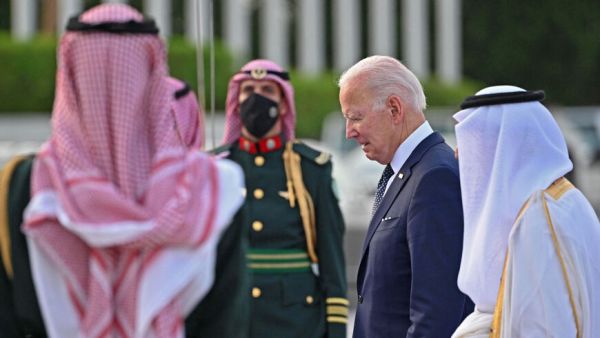Biden is going back to Washington from his Middle East trip empty handed. He never got out of the tour what he set out to do. The Arab leaders meeting in Jeddah under the GCC banner plus Jordan, Iraq and Egypt give him an effective snub and a thumbs down.
Aside from increasing America’s chummy relations with Israel, which was expected, the US President and his White House team failed on at least three counts. On the issue of increasing oil production to lower prices, Biden only got vague promises from his hosts, King Salman and his Crown Prince Mohammad Bin Salman. He didn't receive real assurances and commitments that there would be hikes because of the OPEC plus meeting that sets production quotas for each member country and that is not due to meet till early August.
Biden to American workers vs. Biden to Saudi Arabia pic.twitter.com/zR3R8OZKKL
— Tommy Pigott (@TommyPigott) July 15, 2022
In reality however the Gulf states are happy with the current hikes in oil prices because they mean more revenues for countries like Saudi Arabia and the United Arab Emirates who are fighting a war in Yemen despite the present truce there but it is difficult to see how much that would last. This failure to provide a guaranteed commitment to hike up productivity and some say stabilize prices is seen as a blow to Biden who faces congressional elections in November and high oil prices are not favorable to the American consumer.
Biden before he had your vote: “I would make it very clear we were going to make [the Saudi government] pay the price, and make them, in fact, the pariah that they are.”
— Edward Snowden (@Snowden) July 15, 2022
Biden after he had your vote: pic.twitter.com/lRecCqQrZ6
On second count he failed to convince the Saudis to normalize relations with Israel, despite the tinkering, here and there, of open airspace for all international aircraft carriers. There was much media talk prior to the trip that there is a strong possibility Riyadh would normalize with Israel. Analysts had said the Israelis pushed him to go to Saudi Arabia for this purpose. But this flopped. The topic was not even brought up at the Jeddah Security and Development Summit.
Just to sum up: Biden was bamboozled into going to Saudi Arabia with the promise of more oil.
— Rosie's No Refund Policy (@DarnelSugarfoo) July 16, 2022
He was greeted at the airport by the mayor of Mecca.
MBS then got Joe to fist bump him on camera & absolve him of the murder of Khashoggi.
He then sent Joe home & said "no more oil." pic.twitter.com/ZfO2YMXxNj
If anything it was argued the meeting proved to be decidedly anti-Israeli despite the normalization states of Bahrain and the United Arab Emirates. Every Arab leader in the summit stuck to their principled Palestinian stance regarding independent statehood and the two-state solution, a concept that Biden and the American administration say they accept despite the fact that he already told the Palestinians in Bethlehem when he met President Mahmood Abbas that the time is not ripe to kick-start the Israeli-Palestinian negotiating process.
On the third count Biden failed to whip an anti-Iranian stance for the Gulf countries want a reproachment with Tehran and believe that a conciliatory approach would be better than abrasive outlook with a possibility of a direct strike on Iran which is what Israel wants. That includes the Saudis, who are talking to the Iranians in Baghdad, the UAE, Kuwaitis, Qataris, the Iraqis who want to engage Iran in a constructive dialogue.
Reporter: “President Biden, is Saudi Arabia still a pariah?”
— Real Mac Report (@RealMacReport) July 15, 2022
Joe Biden: ignores all questions from reporters.
MBS is laughing. pic.twitter.com/nij33lOwcu
Israeli had hoped that Biden would convince the Arab countries to establish a NATO-like military alliance in the Arab world to stand up to Iran and its military and nuclear capabilities. But this has failed and the Saudis in a point-blank fashion said they are not interested in such an alliance that would necessarily include Israel although they told they American president that they want to make sure that Iran would never be able to possess the nuclear bomb or any weapon of mass destruction.
Iranians officials on the other hand accused Biden of spreading what they termed as "Iranophobia" and trying to stir the region against the leadership in Tehran. But the White House might be playing some kind of a chess game or what people might be called brinkmanship and sending out signals to the Iranians to accept a new nuclear deal, similar to the 2015 deal, which the US left in 2018 but wants to re-enter under new conditions and new strings attached.
The Iranians are playing hardball despite their continuous meetings in Vienna starting last October and which were interrupted by Russia's war on Ukraine, and their stop-go meetings in Qatar under European auspices. Tehran wants a deal with benefits and Washington wants a deal because it believes this would be the best way to check Iran's nuclear ambitions through a rigorous inspection regime.
Iran accuses US of stoking 'Iranophobia' after Biden's Mideast tour https://t.co/ReHRAKixU1
— Middle East Monitor (@MiddleEastMnt) July 18, 2022
But its as if yet, there is procrastinations on both sides to the delight of Israelis. As well, Biden, a long-time seasoned politician with much experience in the ins and outs of international diplomacy, might be tangling himself up because of his foreign policy options because of the Russian war in the Ukraine and China.
President Biden says he has created a more stable Middle East than we had in the Trump Administration.
— Mike Pompeo (@mikepompeo) July 13, 2022
FALSE. The terrorists and Mullahs in Iran are the only ones who have benefited from Biden’s policies. https://t.co/KyebrRKp09
But when he left Saudi Arabia, he said he is determined this time, not to leave the Middle East to Moscow and Beijing and that Washington wants to re-enter this vital and dynamic regional arena. He signed a strategic accord with the Saudis despite the Jamal Khashoggi murder case, he wants to explore more diplomatic options regarding Iran's nuclear program – and hence the Doha talks – and has even invited the UAE president Mohammad Ben Zayed to the White House to rectify the previously cold relations between Washington and Abu Dhabi.
Joe Biden: "Iran deal doesn't have to do with Iran killing Americans". pic.twitter.com/41wUhPSlil
— Real Mac Report (@RealMacReport) July 13, 2022
Thus, it may seem he left the region empty handed Biden is determined to revitalize relations with different actors in the Middle East.






